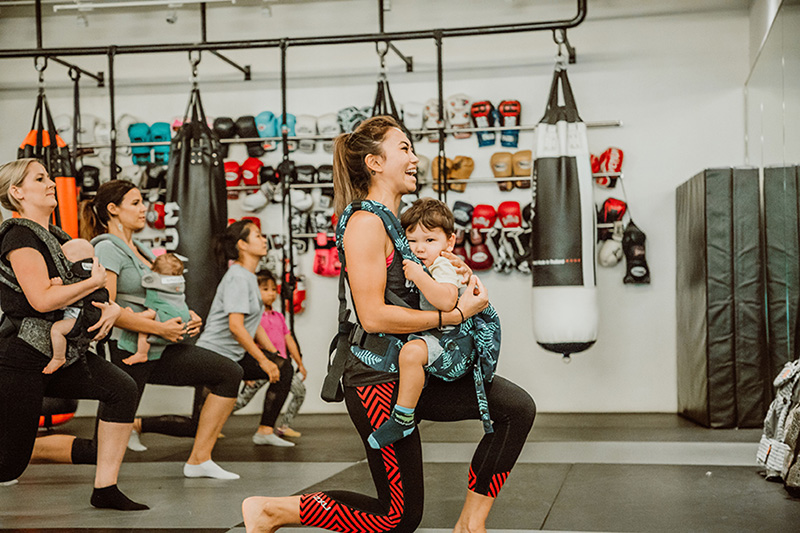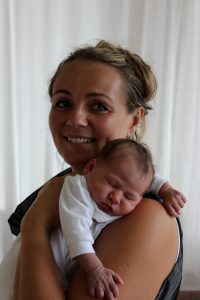We speak to five of Hong Kong’s coolest mamas about their pregnancies and childbirth, and how to stay happy and healthy through it all. By Zoe Belhomme, Tanya Hodgson and Carla Thomas.

 The Yoga Teacher:
The Yoga Teacher:
ROSEMARY VANDENBROUCKE
Yoga Teacher, Pure
From modelling to yoga to launching pop-up discos, there isn’t much that Hong Kong influencer Rosemary Vandenbroucke has started that she hasn’t kicked butt at. Her latest challenge? Motherhood. Rosemary gave birth last year, on the heels of a super typhoon no less. She shares her lessons on how to – sometimes literally – weather the storm during childbirth.
Q: How would you describe your pregnancy in general? What was the best part? What was the worst?
A: The worst part were the random gushing nosebleeds, or the horrible glucose test where you had to fast and then drink cups of sugar water. Also, the constant reminders, both self-inflicted and from others, of what I couldn’t eat and what I shouldn’t be doing.
Q: How did you balance fitness and wellness with your pregnancy?
A: Naturally being pregnant affected my fitness routine, especially in the last trimester. Somedays I found myself out of breath and feeling faint just walking up the Mid-Levels escalators. Thank goodness for yoga though! It kept me sane and balanced. I taught yoga right up until a week before delivering.
Q: Tell us about the delivery. Did anything unexpected happen?
A: I started feeling mild contractions during the super typhoon Mangkhut, one of the worst in Hong Kong history. We were worried we would be giving birth at home on our own, as it was terrifying outside. Thankfully the contractions died down significantly that morning. One of my best friends lives next door and drove us to the hospital as there were no taxis or Ubers available at all. The roads were blocked by the destruction of the storm; what should’ve taken 10 minutes took almost two hours.
My birthday is September 18th. We arrived at the hospital on the 17th at 11:00am. I wanted to share the same birthday as my son, so we asked them to hold o breaking my water. I tried to pass time by watching comedies and disengaging with the contractions as much as I could.
Finally at 10:30pm they broke my water, and at 1:11am on September 18, Hendrix was born. Best birthday present ever!
Q: How about the postpartum period? How did you deal with the emotional and physical demands of the first three months?
A: I’m very grateful to have taken the advice to get a pui yuet [confinement nanny] for the first month. She was amazing, taking care of baby and me. She cooked all my meals and helped with the late- night feeds. I was able to produce good quality breastmilk and even restart my yoga practice again a week after giving birth.
Q: What advice would you give to pregnant and new mums?
A: The best advice would be to take all the advice you get with a grain of salt, as everyone will have an opinion but everyone’s situation is different. Tune in to your intuitive self and do what you feel is right for you and your baby.
 The Midwife:
The Midwife:
HULDA THOREY
Founder & Director, Annerley
Few women have seen more births than veteran midwife Hulda Thorey. Founder of midwife clinic Annerley, this mum of four has nearly two decades of experience helping women in Hong Kong bring their babies into the world. She reflects on the state of Hong Kong’s maternity services and how to best prepare for childbirth.
Q: What drew you to midwifery initially, and what has kept you there?
A: Initially I was inspired, after being a nurse, by having my own children. The midwives who supported me through my pregnancies and births, including the ones I worked with, were incredible women who really had an impact on me.
After that, it just became this very strong passion to combine professional clinical care with kindness and real support to families that otherwise might be in a vulnerable and challenging situation.
Q: How have Hong Kong’s maternity services changed over time?
A: I have been in Hong Kong for 18 years and it has not changed a great deal overall. However, especially in public healthcare, there is more training for the midwives in how to keep childbirth normal and how to help women feel more comfortable. Access for partners in the labour room has not really improved and in private healthcare, I don’t particularly feel that things have changed much.
Q: What’s something you would change about maternity services in Hong Kong?
A: More respect for women’s choices and family-friendly care.
Q: What’s something you always recommend women bring with them to hospital that might not be on your typical “what to pack” lists?
A: A sarong or mini skirt. And something crunchy.
Q: A lot of women are afraid of childbirth. What would you say to them to reassure them about the process?
A: I don’t think I can easily say one thing for all women. However, when talking to them and realising what it is that actually makes them scared, I can usually give them a few things to focus on before and during their births. I try and help them to have healthy expectations for their births, know the environment and the support or lack of support there may be. Find ways to feel strength and support within, as opposed to relying solely on others.
Q: What’s the number one concern that couples giving birth in Hong Kong have?
A: That they will not be able to be together during birth and that they will have trauma to their perineum.
Q: Any practical tips for pregnant ladies or new mums on how to prepare?
A: Yes, many! First and foremost to figure out how they can, even in di icult situations, find a way to see things in a positive light. Whatever happens during pregnancy, birth, after birth, in their relationships, when they feed their babies, when they have toddlers and so on – have a toolbox where you rely on yourself to feel calm and in control. At the end of the day, you cannot really prepare for what will happen.
 The Personal Trainer:
The Personal Trainer:
ZIGGY MAKANT
Personal Trainer, Goji Elite
After giving birth in 2016, personal trainer Ziggy Makant gave up the long, gruelling hours of private client work to focus on maternal fitness. With a background in CrossFit and certifications in pre- and postnatal fitness, Ziggy has got some top tips for getting back into shape post-baby.
Q: How did being pregnant a ect your fitness routine?
A: I had to take a massive step back as I didn’t have the energy that I had previously. I went from training five to six times per week to just once or twice. Having said that, my job is physical so although I wasn’t specifically training, I was still active and on my feet all day.
Q: What is your favourite exercise and why?
A: Personally, I just love pushups! They’re a great exercise for mums to help re-engage core muscles as well as strengthen and tone the arms.
Q: Weak pelvic floor is an area new mums o en worry about. What exercises can help with that?
A: My pelvic floor go-to is what my clients now dub “blueberry breathing,” because the goal is to try and pick up an imaginary blueberry with your pelvic floor muscles as you exhale. You can think of these as kegels or clenches. Your physiotherapist can do an internal exam or ultrasound to see the degree of pelvic floor dysfunction, if any.
Q: Hong Kong recently announced an increase in statutory maternity leave to 14 weeks. What else can be done to support new mums coming back to work?
A: I think a flexi-return to work option is really important, as most mums still aren’t sleeping continuously at that mark. If there was an option to do three days in the o ice, and two half-days for three months, or something to that effect, it would do wonders for the transition into the workplace. I also think there needs to be better paternity leave in place, so fathers can bond with their babies and squash the idea that fathers aren’t valued in the postpartum period.
Q: There are a lot of myths around nutrition for new mums. What advice do you have for anyone breastfeeding?
A: Eating the rainbow is the easiest go-to. Just look at your plate and make sure you have a carb source, fat source, and protein source. If you’re a breastfeeding mother, fat and carbohydrates are the literal building blocks of breastmilk, so it’s really important that these are prevalent in your diet. Your milk will be more nutrient-dense if your own diet is more nutrient-dense. So try to eat ALL the colours of the rainbow, not just green and beige.
 The Mumpreneur:
The Mumpreneur:
TRIXIE VELEZ
Founder, Defin8 Fitness
Endlessly energetic and upbeat, Trixie Velez is a one- woman band for Hong Kong’s cardio connoisseurs. After years of teaching at Flex Studio, she started her own gym in 2016, building a cult following both online and in the studio. After giving birth last year, Trixie gives us the low-down on mumpreneurship.
Q: Your business is rooted in a strong social media following. How did you manage your online presence throughout and after pregnancy?
A: When I was on maternity leave, I actually had more free time, so in between breastfeeding and taking care of the baby, I would stay active on my social channels. I like to think I used my pregnancy as a way of connecting with a new audience and inspiring mums-to-be and new mums to stay fit and healthy.
Q: How long did you take o after having your little girl?
A: Two weeks after delivery I went back to work two hours a day and I officially went back to my old schedule at four weeks postpartum.
Q: That’s fast! What made you go back to work so soon?
A: I’m really passionate about what I do, and so it’s important that I am hands on with my business – plus I have to make sure my clients are keeping themselves fit and healthy. Going back to work so soon gave me a chance to share my experiences and support other Defin8 ladies going through the pregnancy journey.
Q: You seem so on top of everything. Do you still feel the guilt?
A: Oh, everyday just leaving the flat is a struggle. Thankfully, in my line of work I’m active which helps keep my sanity and gets those endorphins going. We all know that postpartum blues are extremely common and so getting a daily dose of exercise keeps me healthy, physically and mentally. This in turn enables me to take care of my daughter better.
Q: Has being a mum had made you better in your professional life in any way?
A: Yes, for sure. Straight away I noticed I have more patience and I generally get less stressed. I let the little things go now whereas I wouldn’t before. Also, before getting pregnant I was certified in pre- and post-natal fitness, but it’s only since I’ve gone through it myself that I can relate to my clients and give them the exact support they need.
Q: Is there a product that you just couldn’t live without?
A: My breast pump and breast pads!
 The Chiropractor:
The Chiropractor:
DR MICHELLE ZHOU MCCULLOCH
Chiropractor, Founder & Director of UP!health
With so much energy focussed on that baby bump in the front, you’d be forgiven for forgetting to look after your back. Chiropractor Dr. Michelle Zhou McCulloch, and mum to 7-month-old Maddy, explains the importance of chiropractic care during and after pregnancy.
Q: How would you describe your pregnancy in general?
A: The best part is definitely feeling little kicks and hiccups in there – it sounds crazy but you do sometimes “forget” you are pregnant, so those little moments remind you that you are literally growing a small human being!
The worst for me was having back issues (sacroiliac joint strain) pretty much throughout the entire pregnancy. My patients all thought it was quite ironic considering I am a chiropractor, however knowing the statistics – over 50 percent of women experience back pain during pregnancy, with the sacroiliac joint most commonly a ected – it was no surprise to me.
Q: Explain why you believe chiropractic care is an important part of the pregnancy and birth process.
A: During pregnancy, natural hormones in the body have a relaxant effect on the joints of your pelvis in order to allow room for your growing baby and eventually for the delivery itself. It’s an essential process that the woman’s body goes through, however this adaptation also causes a lot of strain and stress.
The third trimester is a challenging time for the body, as your baby nears their final birth weight. Spinal and pelvis alignment issues are more common, especially in subsequent pregnancies. While back pain is an obvious symptom of alignment issue, more important is the potential e ect it can have on the position of the baby or your delivery.
Q: Were there any issues for you, as someone who works in a more hands-on industry?
A: As I mentioned, I had back pain throughout my pregnancy and it was likely exacerbated because I was in a physical discipline. I treated patients until I was 33 weeks pregnant. Having regular chiropractic treatments early on, as well as doing regular Pilates and having prenatal massages, helped keep my body mobile and strong.
Q: Did your background as a chiropractor help you with your pregnancy at all?
A: Yes and no. As a chiropractor who has been working in the maternity field for the past 12 years, my knowledge and experience helped in making informed decisions along the way which is very important. At the same time, it also gave me a false sense of security going in. I think the truth is nothing can truly prepare you to become a new parent and every person will have their unique journey that is far from “textbook.”
Q: What advice would you give to pregnant mums, as well as women in the postpartum period?
A: During pregnancy, try to slow down and include one or two things daily that takes care of you – whether it’s a walk or a massage or a few deep breaths with your eyes closed. Also, seek professional help if you have aches and pains – don’t wait. After the baby arrives, go with the flow and take it one day at a time. Remember that you are amazing and you grew and delivered this amazing baby in front of you!
